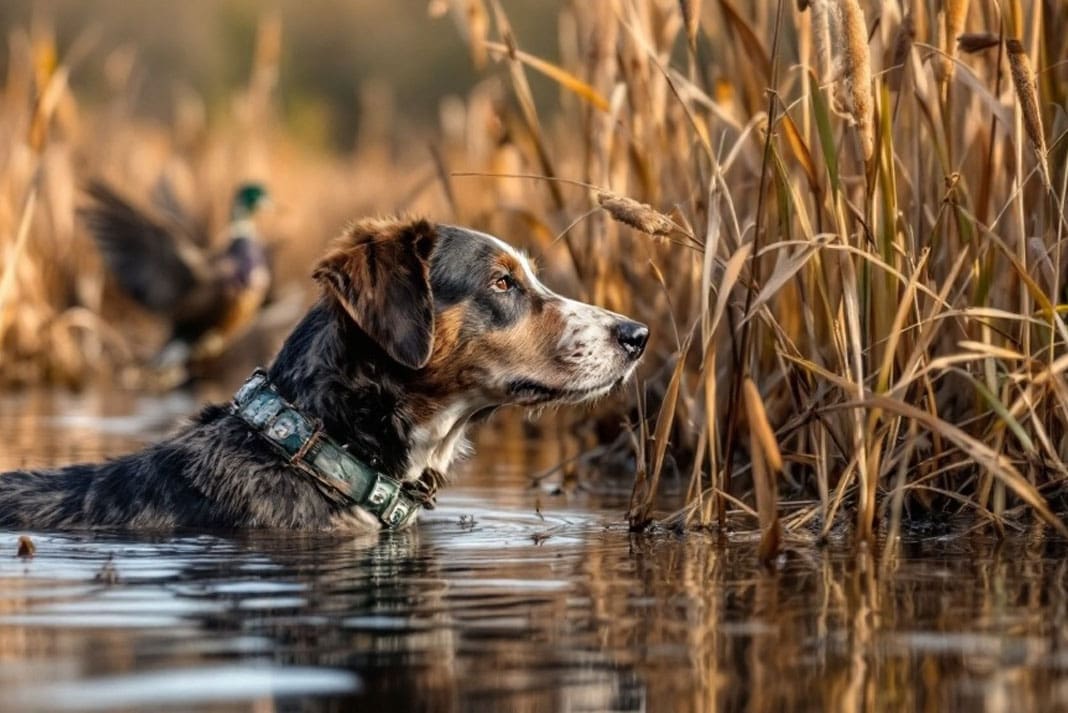Hunting dogs are characterized by their high energy levels and endurance, which are crucial for their performance in the field.
Understanding and meeting these dogs’ energy requirements is essential for their optimal functioning. Their diet should be rich in protein for muscle development and repair, and high in fat as a concentrated energy source.
It is advisable to select high-quality dog food specifically formulated for active dogs to ensure they receive the necessary nutrients. During hunting seasons, when activity levels increase, these dogs may require additional calories, necessitating dietary adjustments. The energy needs of hunting dogs can vary based on breed and size.
Larger breeds typically require more calories to support their size and activity level, while smaller breeds may benefit from a more nutrient-dense diet to meet their energy needs. Understanding the individual requirements of your hunting dog is crucial for providing an appropriate diet that supports their energy levels and overall health. Regular monitoring of the dog’s body condition and making necessary dietary adjustments ensures they receive adequate energy for their hunting activities.
The importance of feeding schedules for hunting dogs
 Regulating Energy Levels and Preventing Blood Sugar Fluctuations
Regulating Energy Levels and Preventing Blood Sugar Fluctuations
By feeding your dog at the same times each day, you can help regulate their energy levels and prevent fluctuations in blood sugar, which can impact their performance in the field.
Supporting Training and Behavior Management
Feeding schedules can also help with training and behavior management in hunting dogs. By feeding your dog at specific times, you can create a routine that supports their training and reinforces positive behavior. This can be especially beneficial for hunting dogs, as it helps them stay focused and attentive during training sessions and while out in the field.
Preventing Food Guarding and Resource Aggression
Furthermore, a consistent feeding schedule can also help prevent food guarding and resource aggression in hunting dogs, as they learn to expect and anticipate their meals at specific times each day. Overall, establishing a feeding schedule is essential for maintaining the health, performance, and behavior of hunting dogs.
Factors to consider when determining feeding times for your hunting dog
When determining feeding times for your hunting dog, there are several factors to consider to ensure that they are receiving the right amount of nutrition to support their energy needs. One important factor to consider is your dog’s activity level. Hunting dogs that are more active may require more frequent meals or larger portions to sustain their energy levels.
It’s important to adjust their feeding times and portion sizes based on their activity level to ensure that they are adequately fueled for their activities. Another factor to consider is the timing of your dog’s hunting activities. If your dog is going to be active in the field for an extended period of time, it’s important to plan their meals accordingly.
Feeding your dog a few hours before their hunting activities can help ensure that they have enough energy to sustain their performance. Additionally, providing them with a small snack or meal during breaks in their hunting activities can help replenish their energy levels and prevent fatigue. Furthermore, it’s important to consider your dog’s individual preferences and behavior when determining feeding times.
Some dogs may prefer to eat at specific times of the day, while others may be more flexible with their feeding schedule. Understanding your dog’s preferences and behavior will help you establish a feeding schedule that works best for them and supports their overall health and performance.
Tips for maintaining a healthy diet for your hunting dog
Maintaining a healthy diet is essential for the overall health and performance of hunting dogs. Here are some tips to help you ensure that your dog is receiving the right nutrition to support their energy needs: 1. Choose a high-quality dog food that is specifically formulated for active dogs.
Look for a food that is rich in protein and fat to support your dog’s energy requirements. 2. Monitor your dog’s body condition and adjust their portion sizes as needed.
It’s important to ensure that your dog is maintaining a healthy weight to support their performance in the field. 3. Provide your dog with regular access to fresh water to keep them hydrated, especially during hunting activities.
4. Consider incorporating healthy snacks or treats into your dog’s diet to provide them with additional nutrients and energy. 5.
Consult with a veterinarian or canine nutritionist to develop a personalized diet plan for your hunting dog based on their individual needs and activity level. By following these tips, you can help maintain a healthy diet for your hunting dog and support their overall health and performance in the field.
The role of pet food in meeting your hunting dog’s nutritional needs
Pet food plays a crucial role in meeting the nutritional needs of hunting dogs. A high-quality pet food that is specifically formulated for active dogs provides the essential nutrients to support their energy requirements and overall health. These foods are typically rich in protein and fat, which are essential for muscle development, energy production, and overall performance in the field.
Additionally, pet food provides a convenient and balanced source of nutrition for hunting dogs, ensuring that they are receiving the right combination of nutrients to support their activity level. Furthermore, pet food provides a consistent and reliable source of nutrition for hunting dogs. Unlike homemade diets, which may be difficult to balance and may not always provide the necessary nutrients, pet food is formulated to meet the specific nutritional needs of active dogs.
This helps ensure that hunting dogs are receiving the right amount of protein, fat, vitamins, and minerals to support their energy requirements and overall health. In addition, pet food also provides convenience for owners, as it eliminates the need to prepare homemade meals or worry about balancing your dog’s diet. By choosing a high-quality pet food that is specifically formulated for active dogs, you can provide your hunting dog with the essential nutrition they need to support their energy levels and performance in the field.
Signs that your hunting dog may need a change in feeding schedule or diet
Weight Changes: A Key Indicator
If your hunting dog is gaining or losing weight unexpectedly, it may be a sign that their feeding schedule or diet needs adjustment. Monitoring your dog’s body condition can help you determine if they are receiving the right amount of nutrition to support their activity level.
Energy Levels: A Critical Component
If your dog seems lethargic or fatigued during hunting activities, it may be a sign that they are not receiving enough energy from their current diet. Adjusting their feeding schedule or diet can help ensure that they have enough energy to sustain their performance in the field.
Digestive Issues and Appetite Changes
If your dog experiences digestive issues such as diarrhea, vomiting, or constipation, it may be a sign that their current diet is not agreeing with them. Similarly, if your dog suddenly loses interest in food or becomes excessively hungry, it may be a sign that their feeding schedule or diet needs adjustment. Changing their diet or feeding schedule can help alleviate these issues and support their overall digestive health. By paying attention to these signs, you can determine if your hunting dog may need a change in feeding schedule or diet to support their overall health and performance in the field.
Consulting with a veterinarian for personalized feeding recommendations for your hunting dog
 Consulting with a veterinarian is essential for developing personalized feeding recommendations for your hunting dog. A veterinarian can assess your dog’s individual needs, activity level, and overall health to develop a diet plan that supports their energy requirements and overall well-being. Additionally, a veterinarian can provide guidance on portion sizes, feeding schedules, and specific dietary requirements based on your dog’s breed, size, and activity level.
Consulting with a veterinarian is essential for developing personalized feeding recommendations for your hunting dog. A veterinarian can assess your dog’s individual needs, activity level, and overall health to develop a diet plan that supports their energy requirements and overall well-being. Additionally, a veterinarian can provide guidance on portion sizes, feeding schedules, and specific dietary requirements based on your dog’s breed, size, and activity level.
Furthermore, a veterinarian can help identify any underlying health issues that may impact your dog’s dietary needs. Certain health conditions such as allergies, digestive issues, or metabolic disorders may require specific dietary adjustments to support your dog’s overall health and well-being. By consulting with a veterinarian, you can ensure that your hunting dog is receiving the right nutrition to support their energy levels and performance in the field.
In addition, a veterinarian can provide guidance on choosing a high-quality pet food that is specifically formulated for active dogs. They can recommend specific brands or formulations based on your dog’s individual needs and dietary requirements. By working with a veterinarian, you can develop a personalized feeding plan that supports your hunting dog’s overall health and performance in the field.
In conclusion, understanding your hunting dog’s energy needs, establishing feeding schedules, considering factors when determining feeding times, maintaining a healthy diet, providing pet food for nutritional needs, recognizing signs for change in feeding schedule or diet, and consulting with a veterinarian are all crucial aspects of ensuring that your hunting dog receives the right nutrition to support their energy requirements and overall health. By following these guidelines and seeking professional advice when needed, you can help maintain the health and performance of your hunting dog for years to come.
